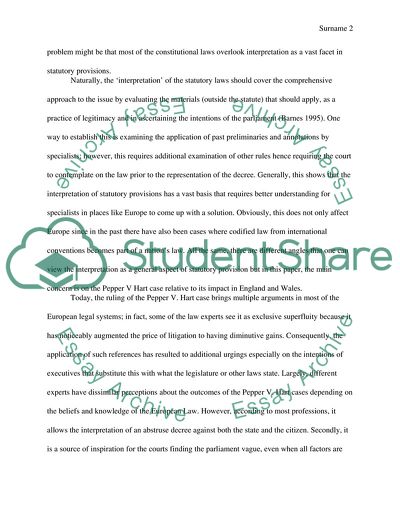Cite this document
(Pepper Versus Hart 1993 Report Example | Topics and Well Written Essays - 1750 words, n.d.)
Pepper Versus Hart 1993 Report Example | Topics and Well Written Essays - 1750 words. https://studentshare.org/law/1854541-to-what-extent-if-at-all-does-the-ruling-in-pepper-v-hart-1993-ac-593-permit-courts-of-england-and-wales-to-draw-on-extrinsic-aids-when-interpreting-statutory-provisions
Pepper Versus Hart 1993 Report Example | Topics and Well Written Essays - 1750 words. https://studentshare.org/law/1854541-to-what-extent-if-at-all-does-the-ruling-in-pepper-v-hart-1993-ac-593-permit-courts-of-england-and-wales-to-draw-on-extrinsic-aids-when-interpreting-statutory-provisions
(Pepper Versus Hart 1993 Report Example | Topics and Well Written Essays - 1750 Words)
Pepper Versus Hart 1993 Report Example | Topics and Well Written Essays - 1750 Words. https://studentshare.org/law/1854541-to-what-extent-if-at-all-does-the-ruling-in-pepper-v-hart-1993-ac-593-permit-courts-of-england-and-wales-to-draw-on-extrinsic-aids-when-interpreting-statutory-provisions.
Pepper Versus Hart 1993 Report Example | Topics and Well Written Essays - 1750 Words. https://studentshare.org/law/1854541-to-what-extent-if-at-all-does-the-ruling-in-pepper-v-hart-1993-ac-593-permit-courts-of-england-and-wales-to-draw-on-extrinsic-aids-when-interpreting-statutory-provisions.
“Pepper Versus Hart 1993 Report Example | Topics and Well Written Essays - 1750 Words”. https://studentshare.org/law/1854541-to-what-extent-if-at-all-does-the-ruling-in-pepper-v-hart-1993-ac-593-permit-courts-of-england-and-wales-to-draw-on-extrinsic-aids-when-interpreting-statutory-provisions.


